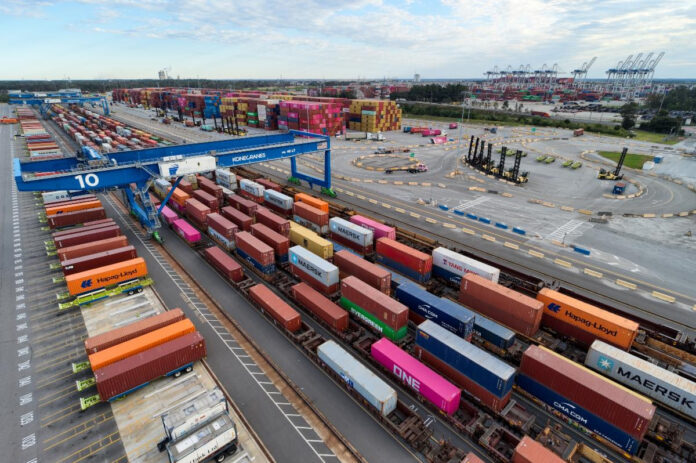The Georgia Ports Authority has reported that the Port of Savannah offers a significant advantage for Indian cargo destined for inland markets such as Atlanta, Chicago, and Dallas, with transit times up to eight days faster compared to US West Coast ports. This efficiency is attributed to the direct links between Savannah and India, with six weekly services connecting the two regions and a total of ten services linking Savannah to the Indian Subcontinent. Twelve ocean carriers operate on these routes, with ocean transit times as short as 29 days. Direct port links include Hazira, Mumbai/Nhava Sheva, Mundra, and Pipavav, with additional stops in Colombo, Sri Lanka, and Port Qasim, Pakistan.
The Port of Savannah’s speed in moving cargo to rail plays a crucial role in the Georgia Ports Authority’s 1-2-3 Strategy, where cargo is offloaded from vessels on day one, loaded onto rail by day two, and reaches inland destinations by day three. This efficient process is further supported by the Port of Savannah’s Mason Mega Rail Terminal, the largest on-terminal rail facility in the Western Hemisphere, spanning 345,000m² and supporting 42 weekly trains. Both Norfolk Southern and CSX, Class I railroads operating in the Eastern US, provide double-stack rail services, ensuring a seamless connection between Savannah and inland markets.
Savannah’s top exports to India include forest products, resins and rubber, and iron and steel, while key imports from India consist of textiles, minerals, and machinery. The strategic location and efficient operations of the Port of Savannah make it a preferred gateway for trade between India and the United States, offering faster transit times and reliable connections to inland destinations.
In addition to its operational efficiency, the Port of Savannah also prioritizes sustainability and environmental responsibility in its operations. The Georgia Ports Authority is committed to reducing its carbon footprint and implementing eco-friendly practices to minimize the impact of maritime activities on the environment. By investing in green technologies and initiatives, the Port of Savannah aims to create a more sustainable and environmentally conscious supply chain for the future.
Furthermore, the Georgia Ports Authority recognizes the importance of community engagement and collaboration in fostering positive relationships with stakeholders and local residents. Through outreach programs, educational initiatives, and partnerships with local organizations, the Port of Savannah seeks to create a mutually beneficial environment that supports economic growth and development while respecting the needs and concerns of the community.
As a crucial gateway for international trade and commerce, the Port of Savannah plays a vital role in connecting businesses and consumers across the globe. By offering efficient logistics solutions, strategic partnerships, and a commitment to sustainability, the Port of Savannah continues to be a leader in the maritime industry, driving economic growth and prosperity for the state of Georgia and beyond.
If you found this information valuable, please consider supporting the Georgia Ports Authority through a donation. Your contribution will help us continue our mission of excellence in maritime operations and environmental stewardship. Thank you for your support.

